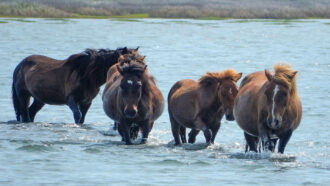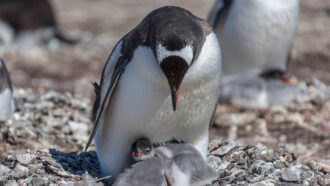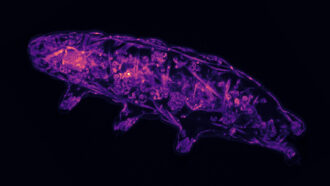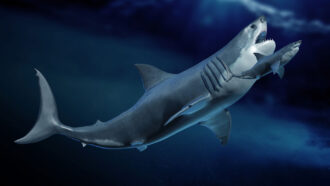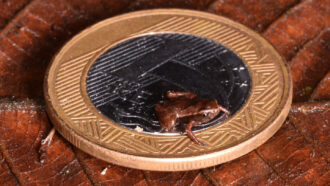What a drag! Fishing gear’s effects on whales
New research shows that removing some debris is better than doing nothing
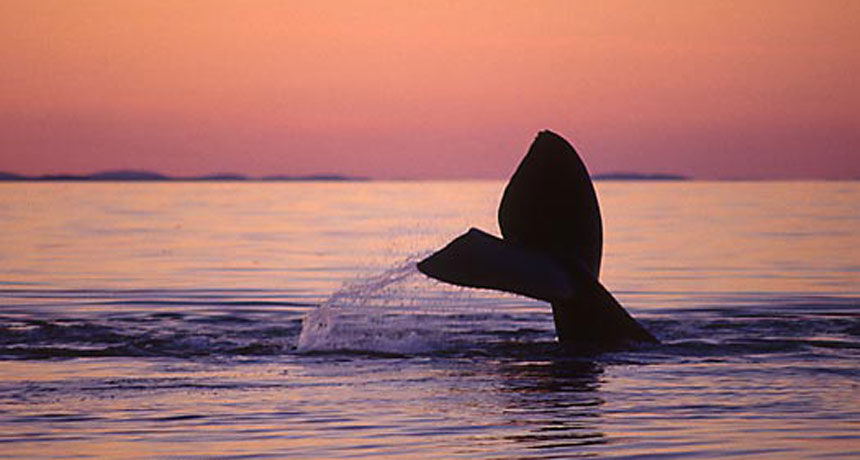
A North Atlantic right whale dives in search of food near Grand Manan Island in Canada’s Bay of Fundy.
Michael Moore/WHOI
By Ilima Loomis
Whales that get tangled up in fishing lines and other gear can be stuck towing it around for months or years. And it’s not pleasant. Those lines can cut into the mammals’ flesh. Some whales will die from their injuries. But how does it actually feel to be carrying all that trash around? Researchers at the Woods Hole Oceanographic Institution, or WHOI, on the Massachusetts coast wanted to know what kind of weight or pull it exerted. They found that heavy traps and bulky buoys cause a whale to feel much more “drag” than will loose ropes. And it can tire them out.
The researchers’ interest had been piqued by a chance encounter with a two-year-old whale on Christmas Day in 2010. The young North Atlantic right whale was wrapped in fishing lines. It wasn’t easy, but the team eventually freed her of most of the debris. They were not in time, however. The whale was injured, exhausted and “so, so, so thin,” says Julie van der Hoop. She works at WHOI as a whale researcher. Freed of the gear, the whale dove deep and swam away. “Unfortunately, she didn’t survive,” van der Hoop says. The whale’s body washed ashore some time later in Florida.
The team suspected that the effort of swimming with the added drag of all that debris caused the whale to get so skinny. The scientists had saved the fishing gear they removed. Now they ran tests to measure the amount of drag it would have caused on the whale.But that would have been only a sample of one. To better know how this debris affects whales, the researchers needed more examples. Van der Hoop realized they had stored away fishing lines and other debris that had been removed from other entangled right whales. The scientists also had collected data about the condition and survival of those whales. They added all of these to their new study.
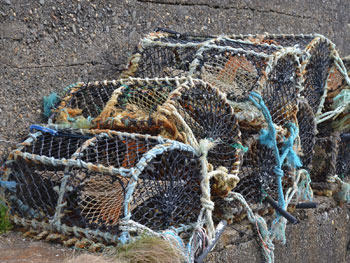
“As we expected, having floats or buoys attached to a piece of line causes much more drag,” van der Hoop now reports. A whale trailing 10 meters (33 feet) of rope — a length about as long as its own body — feels very little drag. But a whale stuck towing something bigger, like a buoy or a lobster trap, is in much worse shape. It will feel three times more drag than what it feels when swimming freely.
The researchers published their new findings in the December Marine Mammal Science.
The value of the new data
The new drag data may explain some earlier observations. On average, entangled whales have to use twice as much energy to swim at the same speed as those that swim unencumbered, a separate study has found. Van der Hoop’s group published those data in 2013 in Marine Mammal Science.
What did surprise van der Hoop this time around was something she learned from entanglement experts as she first started sharing her findings. She had thought being tangled in one lobster trap was the worst that could happen to a whale. But those experts told her they had found animals tangled by lines to more than one lobster trap at the same time.
The new data will help people who respond to entangled whales figure out the best way to help them, says Ed Lyman. He’s a marine biologist at the Hawaiian Islands Humpback Whale National Marine Sanctuary in Maui, Hawaii. He studies — and helps to free up — entangled whales.
Lyman says it’s best to remove all the debris from a whale. Ropes can cut into a whale’s skin and cause other injuries. But sometimes it’s not possible to take everything off. This study shows that even removing some of the debris — especially buoys and other objects that create drag — can really make a big difference to whales, he says.
“You need good data to make good decisions,” he says. “Having these numbers really puts things in perspective.”
Next, the WHOI team hopes to study how other factors affect entangled whales. Which is more important for a whale’s survival: the amount of drag, or the length of time a whale is entangled? Van der Hoop hopes to find out.
“It’s not just what happens if you’re entangled in a lobster pot; it’s what happens if you’re entangled for 200 days,” she says.
Power Words
(for more about Power Words, click here)
buoy A floating device anchored to the bottom of a body of water. A buoy may mark channels, warn of dangers or carry instruments to measure the environment.
debris Scattered fragments, typically of trash or of something that has been destroyed. Space debris, for instance, includes the wreckage of defunct satellites and spacecraft.
drag A slowing force exerted by air or other fluid surrounding a moving object.
force Some outside influence that can change the motion of a body, hold bodies close to one another, or produce motion or stress in a stationary body.
mammal A warm-blooded animal distinguished by the possession of hair or fur, the secretion of milk by females for feeding the young, and (typically) the bearing of live young.
marine Having to do with the ocean world or environment.
marine biologist A scientist who studies creatures that live in ocean water, from bacteria and shellfish to kelp and whales.
National Oceanic and Atmospheric Administration, or NOAA A science agency of the U.S. Department of Commerce. Initially established in 1807 under another name (The Survey of the Coast), this agency focuses on understanding and preserving ocean resources, including fisheries, protecting marine mammals (from seals to whales), studying the seafloor and probing the upper atmosphere.
oceanography (adj. oceanographic) The branch of science that deals with the physical and biological properties and phenomena of the oceans. People who work in this field are known as oceanographers.
whale A common, but fairly imprecise, term for a class of large mammals that lives in the ocean. This group includes dolphins.
